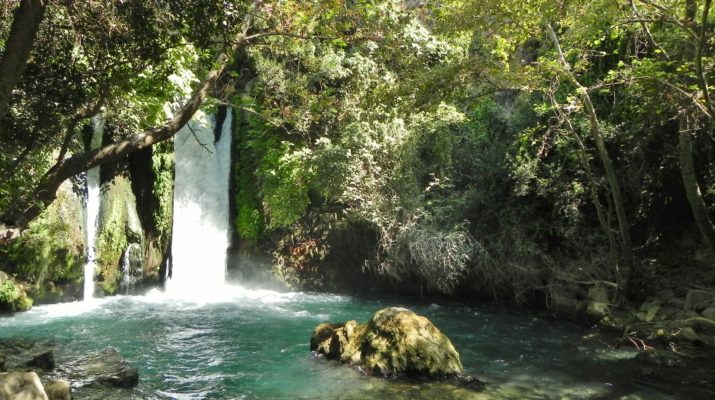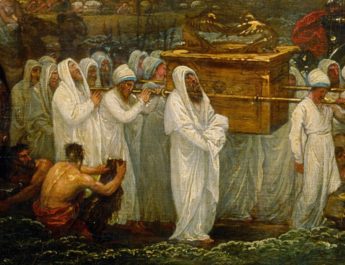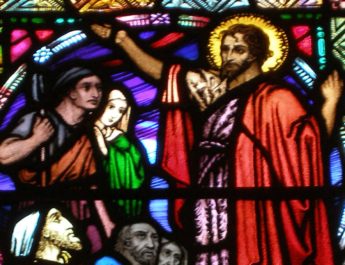Jeremiah 17:5-10
Ordinary C12
5 Thus says the Lord:A
Cursed are thoseB who trustC in mere mortalsD
A “Lord” = YHVH. From havah (to be, become) or hayah (to come to pass, become, be). This is the name of the God of Israel, the self-existent and eternal one, the tetragrammaton. This pronunciation has been lost to time so “Lord” is generally used in its place.
B “those” = geber. From gabar (to be strong or mighty; to prevail or to be insolent) This is man, warrior, a person generally, or a valiant person.
C “trust” = batach. This is to hide for refuge, be secure or sure. Figuratively, it refers to trust, being confident, or hoping.
D “mere mortals” = adam. Perhaps from adam (to be red, make ruddy); related to adamah (ground, dirt, earth). This is man, humankind, also Adam’s name. It refers to a human individual or humanity.
and makeE mere fleshF their strength,G
whose heartsH turn awayI from the Lord.
E “make” = sum. This is to put or place in a literal or figurative sense. It can be appoint, care, change, make, and may other things.
F “mere flesh” = basar. From basar (being a messenger, publish, carry preach; properly, this is being fresh, rosy or cheerful as one bearing news). This is flesh, the body, fat, skin, self, nakedness, humankind, or kin. It can also refer to private parts.
G “strength” = zeroa. Perhaps from zara (to sow, scatter seed, conceive). This is the arm, shoulder, or foreleg of an animal. It is figuratively used for power, force, might, or help.
H “hearts” = leb. May be related to labab (to encourage; properly, to be encased as with fat; used in a good sense, this means to transport someone with love; used in a bad sense, it can mean to dull one’s senses). This is the heart, courage, one’s inner self, the mind, or the will. Heart is only used in a figurative sense in the Old and New Testaments.
I “turn away” = sur. This is to turn aside in a literal or figurative sense – to depart, decline, rebel, remove, or withdraw.
6 They shall beJ like a shrubK in the desert,L
and shall not seeM when reliefN comes.O
J “be” = hayah. Related to “Lord” in v5. See note A above.
K “shrub” = aroer. 2x in OT. From arar (to strip, make bare, destroy). This is a shrub or tree. It may be a juniper.
L “desert” = arabah. From the same as arab (desert plateau, Arabia) OR from arab (to become evening); {from ereb (evening) or from arab (to exchange, give or take on pledge, braid, intermix)}. This is a desert valley or plain, wilderness. Also, the name of a place Arabah.
M “see” = raah. This is to see in a literal or figurative sense so stare, advise, think, view.
N “relief” = tob. From tob (to be pleasing, to be good). This is good, beautiful, pleasant, agreeable, bountiful, at ease. This word is used for goodness as a concept, a good thing, a good person. This can refer to prosperity and welfare as well as joy, kindness, sweetness, and graciousness. So, this is ethically good, but also enjoyably good.
O “comes” = bo. This is to enter, come in, advance, fulfill, bring offerings, enter to worship, attack. It can also have a sexual connotation.
They shall liveP in the parched placesQ of the wilderness,R
P “live” = shakan. This is to settle down in the sense of residing somewhere or staying there permanently. It can mean abide or continue. “Mishkan,” taken from this verb, is the Hebrew word for the Tabernacle (as a place where God abided).
Q “parched places” = charer. 1x in OT. From charar (to be hot, burn, glow, melt, be scorched; figuratively, to incite passion, be angry). This is a stony waste.
R “wilderness” = midbar. From dabar (to speak, command, declare). This is mouth or speech. It can also be desert or wilderness. Additionally, it can be used for a pasture to which one drives cattle.
in an uninhabitedS saltT land.U
7 BlessedV are those who trust in the Lord,
whose trustW is the Lord.
S “uninhabited” = lo + yashab. Yashab is to sit and so to remain and so to dwell. It is sitting for any reason – as a judge, in order to ambush, or just sitting quietly. Causatively, this can mean settling or marrying. This can also mean continue, endure, or establish.
T “salt” = melechah. 3x in OT. From the same as melach (powder; used for salt or salt pit); from malach (properly, to pulverize, temper together, dissipate; also to season or salt). This is saltiness or barren land, like a desert.
U “land” = erets. Root may mean to be firm. This is earth, ground, field land, or country.
V “blessed” = barak. This is to kneel, to bless. It is blessing God as part of worship and adoration or blessing humans to help them. It can be used as a euphemism to say curse God.
W “trust” = mibtach. Related to “trust” in v5. 15x in OT. From batach (see note C above). This is trust, hope, confidence. It is a refuge or assurance.
8 They shall be like a treeX plantedY by water,Z
sending outAA its rootsBB by the stream.CC
X “tree” = ets. Perhaps from atsah (to shut, fasten, firm up, to close one’s eyes). This is tree or other things related to trees like wood, sticks, or stalks. It can also refer to wood products like a plank or staff or gallows. Additionally, this can refer to a carpenter.
Y “planted” = shathal. 10x in OT. This is to plant or transplant.
Z “water” = mayim. This is water, waters, or waterway in a general sense. Figuratively, it can also mean juice, urine, or semen.
AA “sending out” = shalach. This is to send out, away, send for, forsake. It can also mean to divorce or set a slave free.
BB “roots” = shoresh. Perhaps from sharash (to root into soil or uproot). This is a root, depth, line, heel, bottom. It is root in a literal or figurative sense.
CC “stream” = yubal. 1x in OT. From yabal (to bring, carry, flow, lead forth). This is a stream or river.
It shall not fearDD when heatEE comes,
and its leavesFF shall stayGG green;HH
DD “fear” = yare. This is to fear, be afraid, dreadful. It can also refer to fearful reverence – to fear in a moral sense is to say to revere, respect.
EE “heat” = chom. 14x in OT. From chamam (to be warm, heat; to be hot in a literal or figurative sense; to mate). This is hot or warmth.
FF “leaves” = aleh. 18x in OT. From alah (to go up, climb, to be high; to arise in a literal or figurative sense). This is leaf, branch, or foliage.
GG “stay” = hayah. Same as “be” in v6. See note J above.
HH “green” = raanan. From raan (to grow luxuriant, grow green). This is to be fresh, green, flourish, be new or prosperous.
in the yearII of droughtJJ it is not anxious,KK
and it does not ceaseLL to bearMM fruit.NN
II “year” = shanah. From shana (to change, alter). This is a year, age, old. It can also mean yearly.
JJ “drought” = batstsoreth. 2x in OT. From batsar (to enclose, wall up, or make something inaccessible, impenetrable, isolated to fortify, something mighty, to gather grapes). This is a dearth or restraint. So, it is a lack of rain – a drought.
KK “is…anxious” = daag. 7x in OT. This is to fear, be worried, sorrow, be concerned, be anxious, be sorry.
LL “cease” = mush. Perhaps from the same as muwsh (to touch, handle). This is to depart, take away, stop. It is to withdraw in a literal or figurative sense.
MM “bear” = asah. This is to make, do, act, appoint, become in many senses.
NN “fruit” = peri. From parah (to bear fruit, grow, be fruitful, increase; bearing fruit in a literal or figurative sense). This is fruit or reward.
9 The heart is deviousOO above allPP else;
it is perverseQQ—
who can understandRR it?
OO “devious” = aqob. 3x in OT. From aqab (to assail, supplant, overreach, follow or grab someone’s heel, to trip someone up); from aqeb (heel, hind part, hoof, rear guard of an army, one who lies in wait, usurper). This is crooked, steep, hilly. It is a place that can only be crossed by foot because it is so uneven. Figuratively, it can be fraudulent, insidious, or polluted.
PP “all” = kol. From kalal (to complete). This is all or every.
QQ “is perverse” = anash. 9x in OT. This is to be weak, sick, or frail. Figuratively, it can also mean woeful or melancholy.
RR “understand” = yada. This is to know, acknowledge, advise, answer, be aware, be acquainted with. Properly, this is to figure something out by seeing. It includes ideas of observation, recognition, and care about something. It can be used causatively for instruction, designation, and punishment.
10 I the Lord testSS the mindTT
and searchUU the heart,
SS “test” = bachan. This is to examine, test, or prove – as one tests metals. It can also be used literally or figuratively for investigating or trying.
TT “mind” = kilyah. Perhaps from keli (something that was prepared – any implement, utensil, article, vessel, weapon, or instrument; also includes jewels, weapons, bags, carriages, and furniture); from kalah (to end, be finished, complete, prepare, consume, spent, or completely destroyed). This is inward parts, such as kidney or heart. It can also be inmost being as feelings, mind, or within.
UU “search” = chaqar. Properly, this means to penetrate. So, it means to thoroughly investigate, examine, ponder, or seek out.
to giveVV to allWW according to their ways,XX
according to the fruit of their doings.YY
VV “give” = natan. This is to give, put, set, offer. It is to give literally or figuratively.
WW “all” = ish. Related to “is perverse” in v9. Perhaps from enosh (human, humankind, mortal); from anash (see note QQ above). This is man, husband, another, or humankind.
XX “ways” = derek. From darak (to tread, march, to walk. Can also mean affixing a string to a box since one needs to step on it to bend it in the process; so also an archer). This is a road as a thing that is walked on. Can be used figuratively for the path that one’s life takes or how one chooses to live one’s life.
YY “doings” = maalal. From alal (to affect, do, practice, mock, overdo, glean, abuse, pain). This is some kind of deed, action, invention or practice whether good or bad.
Image credit: “Banias Nature Reserve” in Northern Golan, Israel by young shanahan, 2013.




